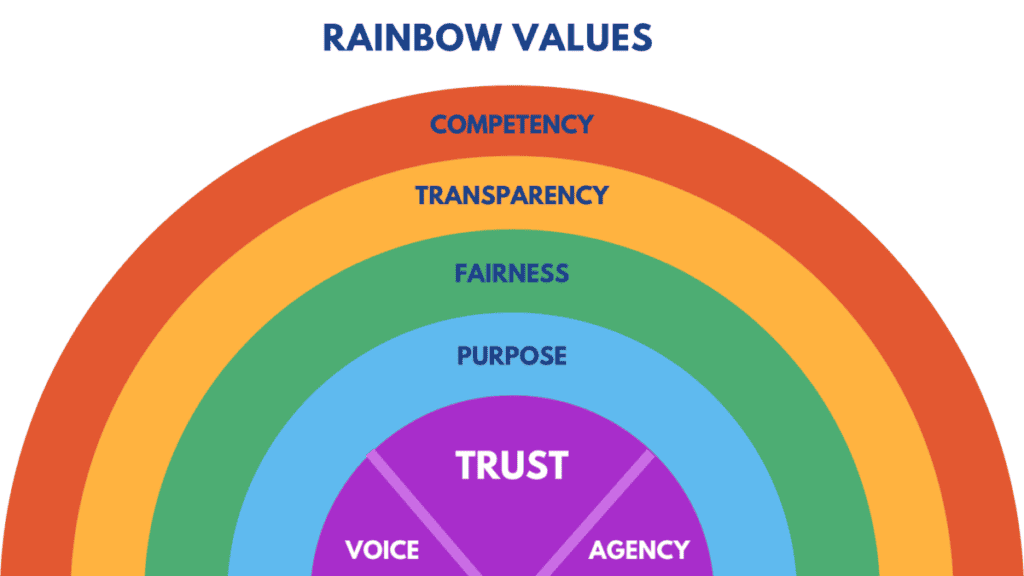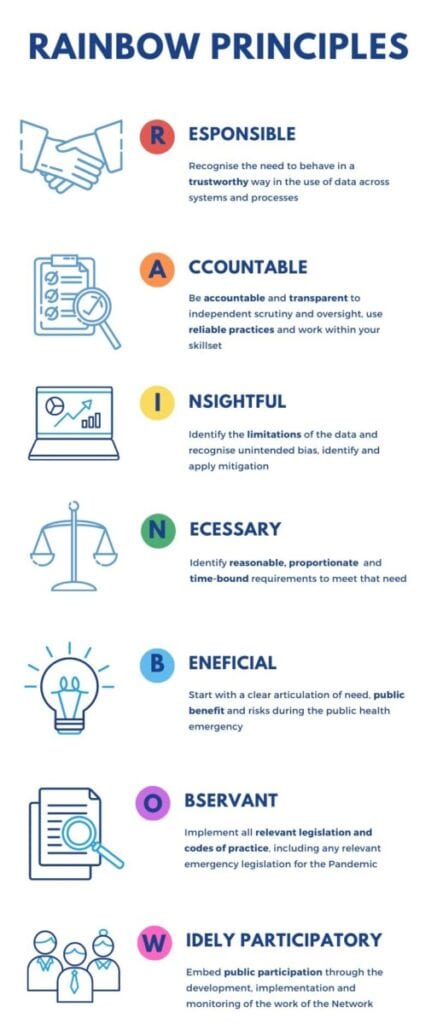The Scottish Government established the COVID-19 Data and Intelligence Network (D&IN) at the beginning of the COVID-19 pandemic, gathering experts from across local health boards, Public Health Scotland, Health and Social Care partnerships and other public bodies committed to developing trusted systems for using data in a quick, ethical, responsible and effective way.
Due to the pandemic requiring the government to restrict the rights and freedoms of people in ways that would not be considered acceptable in normal times, it was agreed that there was a critical need develop the D&IN Ethical Framework to support ethical decision making. Based on our experience in creating practical ethical workbooks for similar projects, we joined the team to help turn their ideas into a usable output.
What are your values?
We started the process by taking the team back to basics. In order for people to be able to engage with an ethical framework and align their thinking to the key priorities of the Network, it is important to signpost some core values that guide the Network’s activity. These need to be practical, accessible and achievable values that encompass what the Network stands for.
We worked with the team to brainstorm some ideas about what the Network wants to be known for, and what it believes in. One of the key elements that emerged from these conversations was that of trust. Particularly in the context of the pandemic, it was important for the team to take this opportunity to create an environment where projects and activity are focused on building, maintaining and encouraging public trust in the Network and their use of data.

How do you put values into practice?
Once we had finalised the values, the next step was to work with the team to ensure that these were embedded in a practical, accessible and valuable way. To complement the Rainbow Values, we developed a set of Rainbow Principles that give a user practical guidance on how to incorporate ethical decision making into their project. The principles are referenced throughout the Ethical Workbook as pointers and reminders to highlight how a team is living the Network’s core values in their project and general activity.

Embedding Ethics
To consolidate the work on values and principles, we assisted the team in creating an Ethical Workbook to be used on projects within the network. The Workbook is made up of a series of questions that follow four key stages of a project:
- The Challenge
- The Data and Digital Technology
- The Public
- The Outputs
The Workbook provides a practical tool to help teams work through the moral and social dilemmas at the earliest point in their work so that the task of reconciling the privacy, rights and freedoms of the public are at the heart of decision making, promoting the responsible and proactive use of data and technology.
The Workbook is a core element of project design and delivery, and a place where project teams can set out very clearly the public benefit and potential harms candidly. Project owners also continue to refer to the Ethical Workbook throughout the project to highlight and address potential issues during the entirety of the project lifecycle.
Having the questions as prompts to open an honest and transparent discussion should help a project team to talk about their project, and its impacts, more holistically. Above all, the Workbook serves as a reminder that it is always important to think about the people behind the data. We made sure that the questions were closely aligned to the natural phases of the project so that they could be easily embedded into day-to-day activity, and add value not just in a project’s early stages, but right through to its completion and dissemination.
Enabling Ethical Literacy
We were delighted to have had this opportunity to engage with a team who wanted to put ethical decision-making at the forefront of their actions in a practical and accessible way. Our mission at the Collaborative is to transform ethics from high-level theory into valuable practical steps that a project team can take to ensure that they are working in the right way and for the right reasons. We hope that the D&IN can now bring the Ethical Workbook to life and begin engaging in valuable ethical conversations across their project portfolio.
View the workbookThis article was written and originally published by Data for Children Collaborative.






